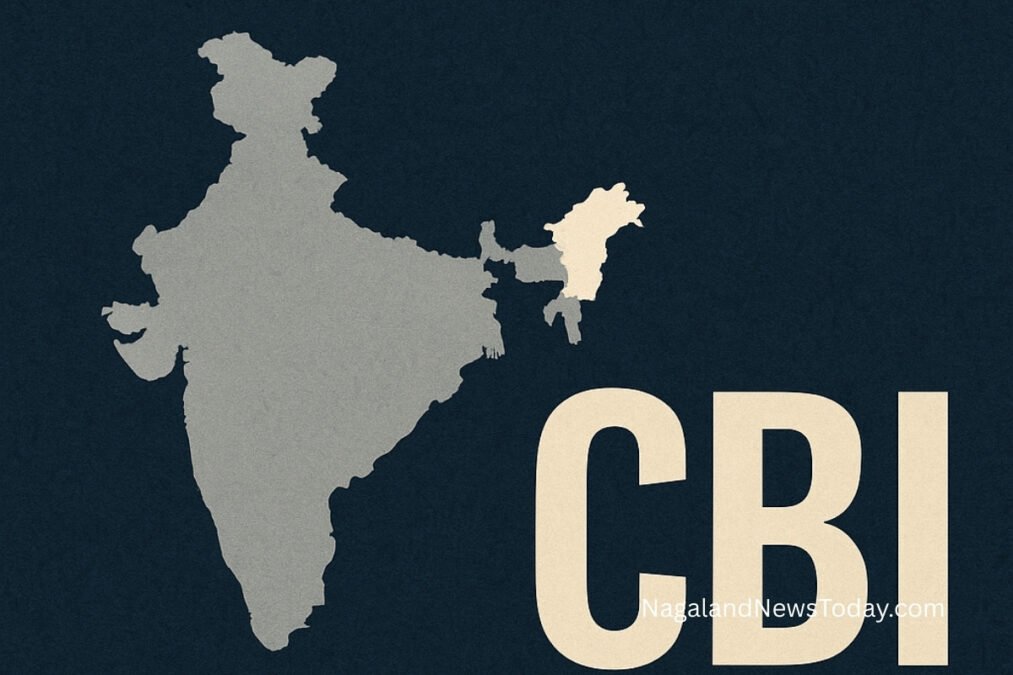Published by Aloto Naga | July 14, 2025
A Singular Exception in India’s Investigative Map
Nagaland holds the distinction of being the only Indian state without a Central Bureau of Investigation (CBI) office—a unique and troubling outlier in India’s federal investigative framework. While even union territories like Puducherry and Delhi host CBI branches, Nagaland’s 60+ year absence has not only puzzled legal observers but raised serious questions about transparency, governance, and public accountability.
This report investigates the underlying causes of this absence, explores the implications on law enforcement and corruption control, and evaluates what this anomaly means for citizens seeking justice in one of India’s most politically sensitive states.
No Office, No Oversight: Why the CBI Is Missing in Nagaland
The CBI, India’s premier criminal investigation agency, was formed in 1963 to handle corruption, financial fraud, and complex crimes requiring inter-state coordination. Its presence across India allows swift responses and local liaison. Except in Nagaland.
Despite multiple attempts by the CBI to open a branch in Nagaland, the state government has reportedly shown little to no interest in assisting the setup, according to the Nagaland Public Rights Awareness and Action Forum (NPRAAF). In 2018, NPRAAF met with CBI officials in Guwahati and offered to arrange land and infrastructure for a proposed branch in Dimapur. The state, however, remained non-committal, and the proposal stalled indefinitely.
💡 Legal Barrier: Consent Under DSPE Act
The key obstacle is Section 6 of the Delhi Special Police Establishment (DSPE) Act, which requires state consent for the CBI to investigate offenses within its borders. While many states grant “general consent” to facilitate ongoing investigations, Nagaland has never provided this on a permanent basis.
This means the CBI can only intervene with case-specific permission or a court order—adding bureaucracy and delay in urgent matters.
The Consequences: Corruption Thrives Without Oversight
Nagaland’s lack of a CBI office is more than symbolic—it has practical consequences for corruption control and public confidence. Multiple corruption cases have emerged in Nagaland’s public departments, yet few result in conviction or even serious investigation.
NPRAAF has flagged systemic corruption in departments including Roads & Bridges, Medical, Education, Rural Development, and Finance. But without an empowered federal agency, most of these scandals remain unresolved.
🏛️ The High Court Construction Scam
A glaring example is the Nagaland High Court complex, launched in 2007 with a ₹43 crore budget but still incomplete nearly two decades later. In 2018, the Gauhati High Court ordered a CBI inquiry, citing suspected “systematic siphoning” of funds. The CBI later filed a chargesheet against engineers and contractors involved in misappropriating ₹3.61 crore. However, the Nagaland government refused to sanction prosecution against some accused officials, triggering rebuke from the judiciary.
This case exemplifies how absence of a local CBI branch—and political will—can hinder justice.
Extortion Under the Guise of Loyalty: The Lawlessness Factor
Beyond corruption, law and order in Nagaland face complex threats, including insurgent-linked extortion. The National Crime Records Bureau (NCRB) reported that in 2021, Nagaland recorded India’s highest rate of extortion per capita—7.6 cases per 100,000 people versus the national average of 0.8. Also Read CBI Books Nagaland University Dean in ₹2 Lakh Bribe Case
Local militant groups reportedly run parallel administrations, collecting “taxes” from civilians, businesses, and even government employees. The Naga Hoho, an apex tribal body, controversially justified these levies as “loyalty taxes” for the Naga cause.
Former police officers have admitted that “silence from the state” creates legal weakness in tackling such extortion, further weakening the credibility of law enforcement.
An Illusion of Clean Governance: NCRB Data Misleads
Shockingly, the NCRB’s 2022 report shows zero registered corruption cases in Nagaland, giving the false impression of a clean administration. In reality, this is more a reflection of poor vigilance and underreporting than an actual absence of crime.
Between 2014 and 2022, Nagaland registered only 57 corruption cases—many surfacing only after NGO intervention or external media coverage. For example, in 2025, a Dimapur-based cashier of the Food Corporation of India (FCI) was caught with ₹19 crore in disproportionate assets—despite a salary of only ₹40 lakh over six years. The case emerged only after the CBI launched an inquiry from its Imphal branch.
CBI Raids from Outside: A Flawed System
Without a permanent presence, CBI teams must fly in from other states, resulting in delayed actions, logistical issues, and poor local coordination.
In February 2024, CBI officers raided the Agriculture Production Commissioner’s office in Kohima after officials were caught with ₹70 lakh in cash at Delhi Airport. The state’s defensive response, distancing departments from the accused, revealed a culture of evasion, not cooperation.
Intimidation, Inertia, and Internal Resistance
NPRAAF activists pushing for a CBI branch in Nagaland faced threats and intimidation. This raises concerns for CBI informants, whistleblowers, or officers who might operate without secure ground support. A permanent office is not just about logistics—it is a necessity for continuous intelligence-gathering, safety, and visibility.
What Will It Take for Nagaland to Change?
Civil society voices, including NPRAAF and ACAUT, continue to push for clean governance and central agency involvement. The Centre has shown increasing interest, with agencies like the Enforcement Directorate (ED) and National Investigation Agency (NIA) launching probes in Nagaland.
However, unless the state government grants general consent and facilitates CBI infrastructure, this gap will persist—allowing corruption and criminality to go unpunished.
Conclusion: A Case for Urgency and Accountability
Nagaland’s CBI vacuum is not merely administrative—it is a structural failure undermining the justice system. It affects everything from financial integrity to public safety.
For a state heavily reliant on central funding, the absence of central oversight invites questions about misuse, inefficiency, and selective enforcement. Establishing a CBI branch is not about political vendetta—it is about restoring public trust.
Until this is resolved, Nagaland risks becoming a loophole in India’s fight against corruption. The time for action is now.


